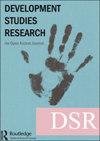On international household survey data availability for assessing pre-pandemic monetary and multidimensional poverty in developing countries
Q2 Social Sciences
引用次数: 0
Abstract
ABSTRACT Data availability plays a crucial role in the fight against poverty. Yet, it lags behind the data available on most other economic phenomena. This paper catalogs and reviews existing data availability for low- and middle-income countries with a view to break the cycle of outdated poverty data and strengthen statistical systems – while drawing readers’ attention to existing information and experiences. Countries that generate and analyze frequent and accurate poverty data are identified to show what is possible and to better document what is already available. Results show that data for both monetary and multidimensional poverty dramatically increased since 1980. Sixty countries already produce annual updates to key statistics, and some have continuous household surveys with cost-cutting synergies. International agencies have explored short surveys for comparable data but the success and uptake of these have not followed expected patterns. Certain regions have agreed on harmonized variable definitions across countries, and new technologies reduce lags between data collection and analysis. These existing resources and experiences can inform much-needed efforts to expand data availability.关于评估发展中国家疫情前货币和多层面贫困的国际家庭调查数据可用性
摘要数据可用性在消除贫困的斗争中发挥着至关重要的作用。然而,它落后于大多数其他经济现象的可用数据。本文对低收入和中等收入国家现有的可用数据进行了编目和审查,以打破过时的贫困数据循环,加强统计系统,同时提请读者注意现有的信息和经验。确定了生成和分析频繁和准确的贫困数据的国家,以显示什么是可能的,并更好地记录现有的数据。结果显示,自1980年以来,货币贫困和多层面贫困的数据都大幅增加。60个国家已经对关键统计数据进行了年度更新,一些国家还进行了具有成本削减协同效应的持续家庭调查。国际机构已经探索了可比数据的短期调查,但这些调查的成功和接受并没有遵循预期的模式。某些区域已就各国统一的变量定义达成一致,新技术减少了数据收集和分析之间的滞后。这些现有资源和经验可以为扩大数据可用性的急需努力提供信息。
本文章由计算机程序翻译,如有差异,请以英文原文为准。
求助全文
约1分钟内获得全文
求助全文
来源期刊

Development Studies Research
Social Sciences-Development
CiteScore
3.20
自引率
0.00%
发文量
20
审稿时长
12 weeks
期刊介绍:
Development Studies Research ( DSR) is a Routledge journal dedicated to furthering debates in development studies. The journal provides a valuable platform for academics and practitioners to present their research on development issues to as broad an audience as possible. All DSR papers are published Open Access. This ensures that anyone, anywhere can engage with the valuable work being carried out by the myriad of academics and practitioners engaged in development research. The readership of DSR demonstrates that our goal of reaching as broad an audience as possible is being achieved. Papers are accessed by over 140 countries, some reaching over 9,000 downloads. The importance of the journal to impact is thus critical and the significance of OA to development researchers, exponential. Since its 2014 launch, the journal has examined numerous development issues from across the globe, including indigenous struggles, aid effectiveness, small-scale farming for poverty reduction, sustainable entrepreneurship, agricultural development, climate risk and the ‘resource curse’. Every paper published in DSR is an emblem of scientific rigour, having been reviewed first by members of an esteemed Editorial Board, and then by expert academics in a rigorous review process. Every paper, from the one examining a post-Millennium Development Goals environment by one of its architects (see Vandermortele 2014), to ones using established academic theory to understand development-imposed change (see Heeks and Stanforth 2015), and the more policy-oriented papers that contribute valuable recommendations to policy-makers and practitioners (see DSR Editor’s Choice: Policy), reaches a multidisciplinary audience.
 求助内容:
求助内容: 应助结果提醒方式:
应助结果提醒方式:


